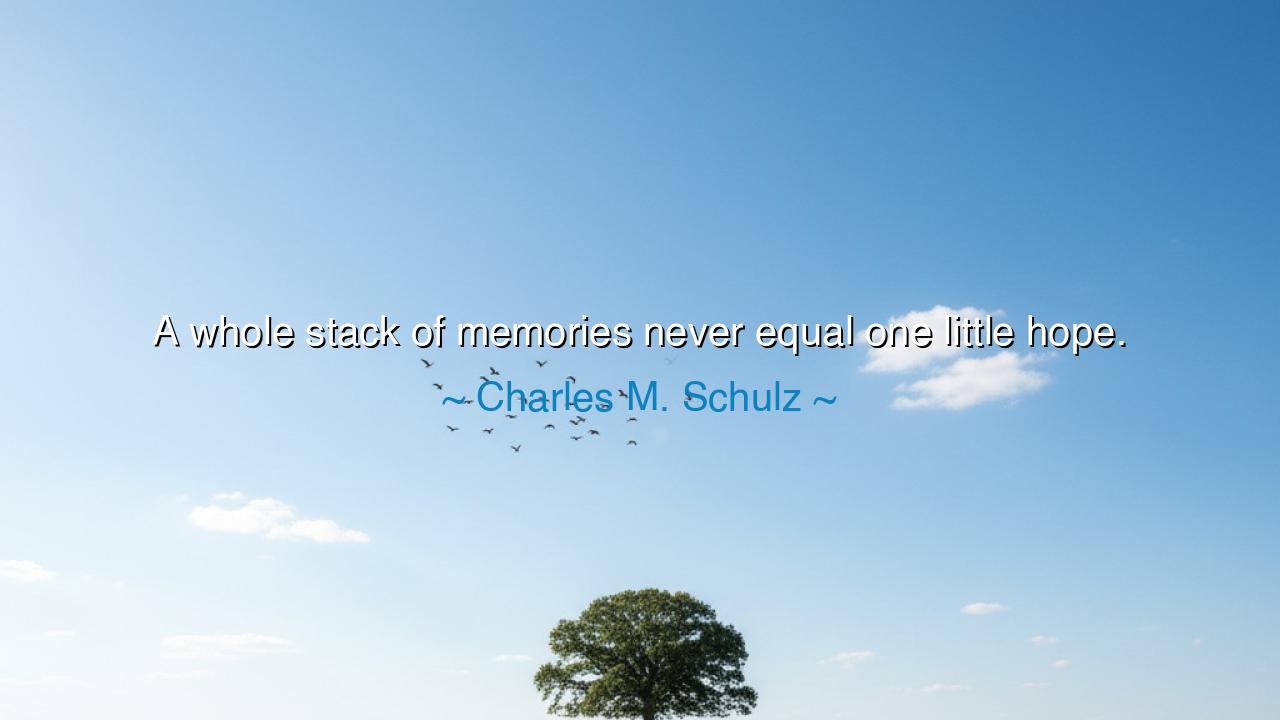
A whole stack of memories never equal one little hope.






In the gentle wisdom of simplicity, the beloved philosopher of pen and ink, Charles M. Schulz, creator of Peanuts, once wrote: “A whole stack of memories never equal one little hope.” These words, though born from the quiet humor of comics, carry the depth of ancient truth. They remind us that the past, no matter how golden or cherished, cannot sustain the soul as powerfully as the faintest glimmer of hope for the future. For memory looks backward, but hope looks forward, and the human spirit, to remain alive, must always turn its gaze toward the light that is yet to come.
To hold memories is to treasure what has been — the laughter of childhood, the faces now gone, the days that will not return. They are the sacred tapestries of our lives, each thread woven with tenderness and loss. Yet Schulz, wise in his understanding of human hearts, teaches that even a thousand memories cannot warm the coldness of despair. It is hope — that small, trembling flame that whispers of what may yet be — that gives strength to rise again when all seems spent. For memory comforts; but hope creates. Memory sustains the past; hope sustains life.
This truth has echoed through the ages, carried by those who endured great darkness. Consider the story of Nelson Mandela, who, imprisoned for twenty-seven years, had nothing but memory to keep him company — memory of sunlight, of freedom, of his family’s faces. Yet it was not those memories alone that sustained him; it was hope — the unwavering belief that one day his people would walk free. When asked how he endured, he said, “I never lost hope.” It was that hope, not nostalgia for what was lost, that transformed his suffering into strength. And when at last he emerged from his cell, the world saw in him a living testament to Schulz’s truth: that one little hope can outweigh the heaviest past.
In our own lives, too, we must beware the sweet trap of the past. The mind often clings to what once was — to days when we were happier, stronger, or loved. But to live only in memory is to grow still, like a pond untouched by wind. It is hope, not remembrance, that stirs the waters of the soul and keeps life flowing. Even the smallest dream — a new beginning, a gentle change, the faint belief that tomorrow may hold something better — has power beyond all recollection. The ancient poet Hesiod wrote that when Pandora opened her fabled jar and released every sorrow into the world, Hope remained. It alone stood against despair. From that time forth, humanity has lived by its light.
There is also humility in Schulz’s words. He speaks not of grand ambition, but of “one little hope.” He reminds us that even the smallest ember can illuminate the night. You do not need great certainty or perfect plans — only the quiet will to believe that life is not finished with you yet. The childlike faith that Schulz captured in his characters — Charlie Brown’s endless optimism, Snoopy’s dreaming heart — reflects this truth. It is the innocence of hope, pure and persistent, that keeps the weary spirit alive when the weight of memory threatens to crush it.
Thus, the quote is not a dismissal of memory, but a reordering of values. Memories are treasures, yes — they are the echoes of the life we have lived. But they are the past’s song, not tomorrow’s promise. To cling to them too tightly is to anchor oneself in stillness. The wise know that to honor the past, one must use it as soil in which to plant the seed of hope. For what is memory without the dream of continuation? What is yesterday’s beauty if it gives birth to no tomorrow?
So, O listener, let this teaching settle upon your heart: cherish your memories, but do not dwell within them. Let them be the stars that light your night — but let hope be your dawn. When life feels heavy with endings, hold fast to even the smallest beginnings. Speak softly to your own soul, and say: “Tomorrow still lives. The story is not over.” Act, even in small ways, toward that which you wish to see born. For one little hope, tended with patience, can grow greater than all the yesterdays combined.
And when the darkness comes — as it surely will, for all who live and love — remember Charles Schulz’s quiet wisdom: hope is the art of believing in light before it appears. The memories behind you may bring comfort, but the hope before you brings life. Guard it, nurture it, and let it lead you ever onward — for the heart that hopes, even faintly, is a heart that cannot die.






AAdministratorAdministrator
Welcome, honored guests. Please leave a comment, we will respond soon